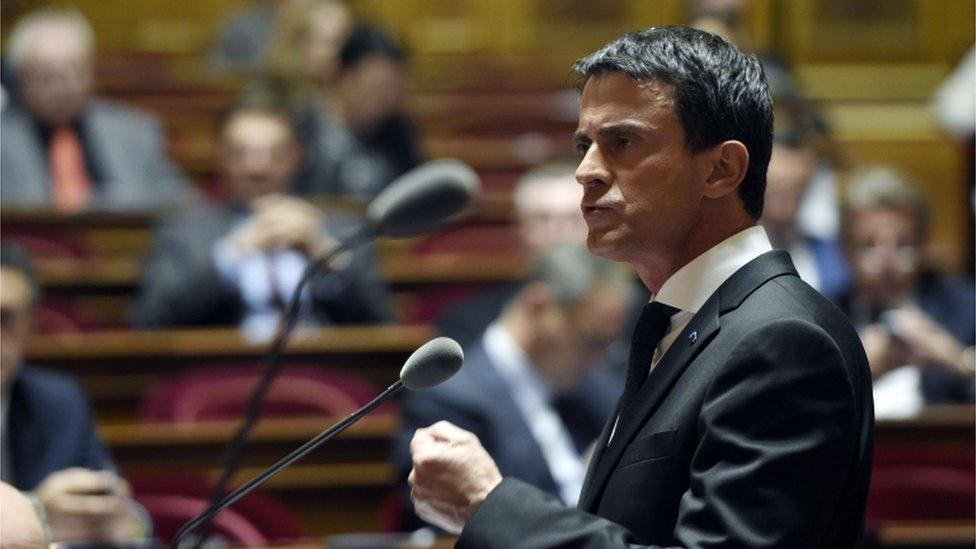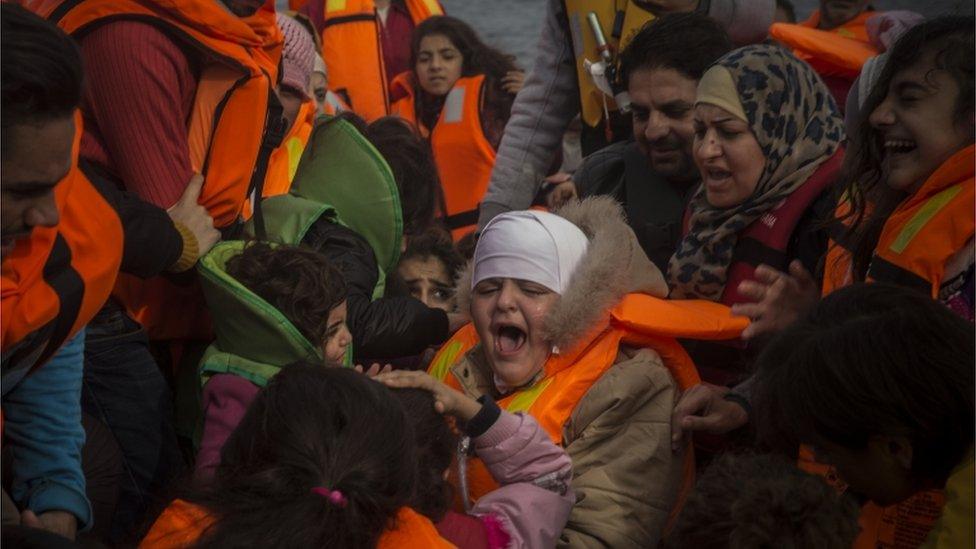Migrant crisis: France Valls warns on refugee numbers
- Published

Mr Valls has insisted that France will not accept more than 30,000 asylum seekers over the next two years
European countries cannot accept so many refugees, the French prime minister has been quoted as saying.
Manuel Valls told journalists if stricter controls were not imposed on the EU's external borders, then people would say "enough of Europe".
Europe's border controls have come under renewed scrutiny since the attacks in Paris on 13 November.
German Chancellor Angela Merkel met Mr Valls and President Francois Hollande in Paris on Wednesday evening.
Many of the hundreds of thousands of migrants and refugees who have entered the EU since August have headed through the Western Balkans to Germany, which expects around one million asylum applications this year alone.
"It was not France that said 'Come!'" Mr Valls said, indicating that the blame for the influx lay with Germany's change of policy towards accepting Syrian refugees.
Several EU countries have imposed border controls in recent weeks - despite the Schengen system of passport-free movement - in an attempt to reduce the number of arrivals.
European Commission chief Jean-Claude Juncker told the European Parliament on Wednesday that the Schengen agreement was "partly comatose". And he warned that if it failed, then the euro could fail too.
"A single currency makes no sense if Schengen falls. It is one of the keystones of European construction," he said.

A decline in the number of arrivals over the weekend apparently reversed on Monday and Tuesday
Fears Europe's open borders could let in Islamic State militants among the large number of people crossing the continent in recent months were realised when it emerged that two of the bombers had recently entered Europe through Greece.
Prime Minister Valls told Sueddeutsche Zeitung, external that Europe had been stretched beyond its limits by the migrant crisis.
"We cannot accommodate any more refugees in Europe, that's not possible," he said. Mr Valls's office later said there had been an error in translation and he had intended to say that Europe could no longer take "so many refugees".
Angela Merkel has meanwhile stressed the importance of a controversial plan to redistribute asylum seekers based on quotas.
She said the future of the Schengen agreement would be determined by the relocation scheme.
Increased strain
The International Organization of Migration reported a "drastic decrease", external in the number of migrants arriving in Greece over the weekend.
But the UN's refugee agency told Reuters that talk of a decline may be "premature" amid indications that numbers climbed again on Monday and Tuesday.
Migrants hoping to travel through Europe must prove they come from Syria, Iraq or Afghanistan to be let through the border with Macedonia
Most of the migrants land in Greece by boat and then travel through Europe to more affluent countries, mainly Germany and Sweden.
Balkan countries, including Macedonia and Croatia, sparked human rights concerns last week by imposing new border restrictions - only allowing passage to people fleeing countries affected by war.
Hundreds of migrants stuck at the Greece-Macedonia border have staged protests, including by sewing their lips together.

A note on terminology: The BBC uses the term migrant to refer to all people on the move who have yet to complete the legal process of claiming asylum. This group includes people fleeing war-torn countries such as Syria, who are likely to be granted refugee status, as well as people who are seeking jobs and better lives, who governments are likely to rule are economic migrants.